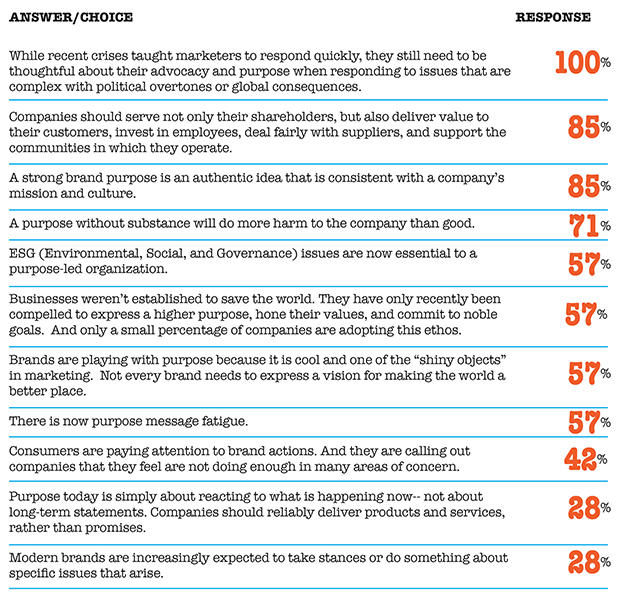
Purpose and Profits– Does the Balance Shift with Economic Uncertainty?
IN A MARKETING WORLD where expressing brand purpose is now de riguer, The Internationalist asked its global audience if it is possible to balance purpose and profits amid economic uncertainty. In many ways, the survey answers were surprising. While respondents clearly had a strong understanding of the fundamentals of purpose-driven marketing, they were increasingly skeptical of not only “purpose washing,” but of immediately aligning with specific instances of perceived “political activism.”
Remarkably, all survey respondents agreed with the statement: While recent crises taught marketers to respond quickly, they still need to be thoughtful about their advocacy and purpose when responding to issues that are complex with political overtones or global consequences. There appears to be a delicate balance between representing consumers’ values and taking sides in debates in an era of increased polarization and a distrust of online information.
An overwhelming 85% of those surveyed believe that economic change will shift purpose priorities. Many expect some corporate belt tightening as talk of inflation, recession, cost of living increases, supply chain challenges, skyrocketing energy and food prices, and the effects of the war in Ukraine are part of daily discussions. As several high-profile companies announce layoffs, increased focus on the bottom line is inevitable.
A strong majority, or 57% of those surveyed, believe that marketers have gone too far in the pursuit of purpose— to the point that they agree that “doing good” could be detrimental to growth. More than half feel: “There is now purpose message fatigue.”
Yet, without question, purpose matters, and many companies have demonstrated the difference a purpose-led ethos can make to their businesses, employees, stakeholders, and communities at large. However, like all popular terminology, there are instances when purpose can appear to be “too much” as it lacks an authenticity directly tied to a company’s mission and activities. Interestingly, most survey respondent believe that a “purpose gap” exists now between the stated values a company or brand espouses and the actions they take.
Interestingly, Kantar’s recent release of its fourth annual Who Cares? Who Does? study that tracks global consumer attitudes to purchasing eco-friendly products shows that the number of “Eco Active” households has declined for the first time. There is evidence to suggest that economic struggles are making it harder to act sustainably. In fact, 45% of people in the Kantar study said that they agree or strongly agree with the statement “I have found it harder to act sustainably recently due to social or financial constraints.”
Today’s marketers face a long list of urgent priorities as they consider the implications of global crises while balancing shifting customer sentiment. Yet, these pressures continue to force marketers the world over to adopt new thinking and expand their skills.
Please check ALL statements that represent what you believe purpose means now:

We find that optional comments in a survey can often add to the conversation around important issues. Here are some of the perspectives we received from marketers:
“Reaching for an authentic ‘universal’ purpose is admirable. Just stay away from picking sides in political debates. No one is against responsible environmental stewardship; but there are disagreements about means. Don’t get into those debates.”
“While I believe ‘Purpose’ should be foundational, too many companies are confusing Purpose with Politics. An increasing number are taking public political positions and venturing into the realm of political activism. This can be both misguided and harmful.”
“Many companies are facing massive losses in customer support (market share, revenue, etc.) because of misguided approaches to fractionalized purposes. Stay universal and avoid political divides.”
“Sometimes you must rethink purpose. Rethinking is learning. We should not be afraid to rethink our purpose. It is a healthy exercise to build this into your planning.”
“It depends on what we mean by purpose. If the purpose is ‘solving customers’ problems,’ then purpose is still relevant. But in most cases, it is seen as something bigger, and then it goes beyond what customers look for.”
In June, Marc Pritchard, Chief Brand Officer at Procter & Gamble, and long-time advocate of being “a force for good and a force for growth,” clarified these thoughts in Paris at VivaTech, a leading event for European startups. He underscored how companies “first and foremost” are in business. “Our growth drives economic good. Growth drives jobs. … And then it enables you to do more good for society and the planet.” His words may suggest a shifting purpose-profit equilibrium ahead as changing economics usher in a new reality for brands.
Unilever also made headlines last year when one investor stated in an open letter that the company was “obsessed with publicly displaying sustainability credentials at the expense of focusing on the fundamentals of the business.”
The Internationalist conducted this survey during the summer of 2022, as part of our Internationalist Insights series, among marketers worldwide to examine if purpose can clearly lead to brand growth—regardless of economic conditions. To keep the survey short and relevant, responses close when completed submissions from 50 top marketer are received. These results help to shape The Internationalist’s content, think tanks and initiatives around marketers’ core concerns, while adding to our Marketing Makes a World of Difference™ Thought Leadership initiative.



